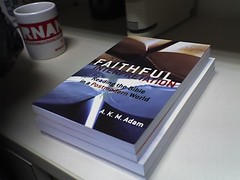Margaret had never read much of Rudolf Bultmann’s work before this year of her doctoral program, so she messaged me to ask some questions. We were intrigued to chat about some of the patterns of similarity and difference between Bultmann and Karl Barth, and what Margaret might make of Bultmann for her own work.
One of the peculiarities of our discussion was our very firm demurrer from Bultmann’s own Heideggerian theology — but our common resistance wasn’t based on the (frequent) argument that Bultmann “imports alien concerns into the text,” or that his existential interpretation was anachronistic, or that “demythologizing” misses the point of the writings he claimed to be interpreting. On our hermeneutical perspective, there’s no “importing” or “exporting” in interpretation, so we can’t indict him on the first charge. We all contextualize what we read in terms that aren’t already implied by the text before us, so Bultmann’s not formally different from any other reader on that score. We rejoice in anachronism, so long as it’s practiced with due caution; Bultmann was more reckless than we’d approve, but we’d have to acquit on the charge of anachronism too, on the basis of selective enforcement if no other. And complaints about “demythologizing” beg the question by presupposing that some other context is intrinsically more fitting for reading Paul and John than is Heideggerian existentialism — and we don’t buy that, either.
Our objections to Bultmann fall into two main categories. First, he seems at various pivotal points not to be offering a convincing account of the text he’s ostensibly interpreting, but rather is explaining what would have to be true in order for his interpretation to be correct. But since we don’t already buy his interpretation, the gesture heightens our sense of critical sleight-of-hand. We can see Bultmann deal from the bottom of the deck, and though he shows us a handsome poker hand, we still question the fairness of his dealing. Second, and more interesting to us, is the point that although we don’t dispute his critical prerogative to interpret the New Testament in terms of a particular strain of twentieth-century German existential thought, we can’t understand how one warrants that as a work of Christian theology. Isn’t it more like the current vogue of dressing Paul up in a black turtleneck and saying that he’s the progenitor of a postmodern ethics of difference? (I’m looking at you, Badiou and Zizek, among others.)
But if you’re going to take up the vocation of being a Christian theological interpreter of the New Testament, why not lend a little more attention to the deep, subtle interpretive tradition that provides for your guidance such brilliant readers as Origen, the Cappadocians, Augustine, Thomas, and all that bunch? Of course, part of the answer is that he’s a Protestant, and part of the answer that he’s a modern Christian who can’t submit his intellectual liberty to the judgments of the ancients — but as a result of his inability to give a rich account of the church’s theological deliberations over the centuries, his theology suffers from a foreshortened perspective on the truth-claims he makes. While he may produce an exquisitely wrought theological text in the end, it holds little interest whatsoever to Christians who regard the New Testament as more canonically pertinent than, for instance, Being and Time. That’s a good book, and Bultmann’s Theology of the New Testament is an excellent, fine, careful exercise in interpretation; but as Christian theology, it leaves nigh onto twenty centuries out of the picture. Anachronism we can live with, and contextualization we can live with, and “eisegesis” we can live with, but we can’t say much on behalf of a theological proposal that ignores the creeds and the great articulators of theological soundness.
Continue reading “Bultmann and Barth”

